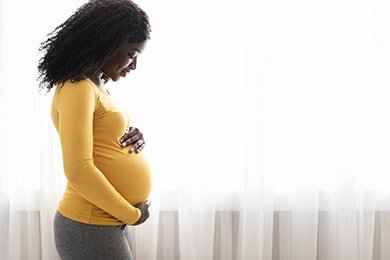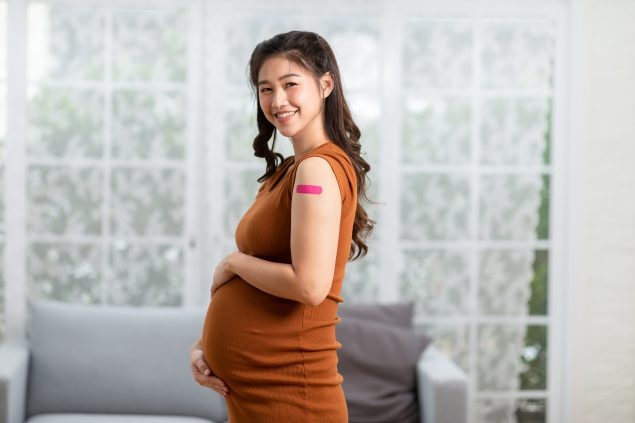Recommendations for Fully Vaccinated People
COVID-19 Homepage
COVID-19 Vaccines While Pregnant or Breastfeeding
- Everyone ages 6 months and older is recommended to get the updated COVID-19 vaccine, including people who are pregnant, breastfeeding a baby, trying to get pregnant now, or who might become pregnant in the future.
- COVID-19 vaccination during pregnancy is safe and effective.
- COVID-19 vaccines are not associated with fertility problems in women or men.
- Infants ages 6 months and older are recommended to get the updated COVID-19 vaccine even if born to people who were vaccinated or had COVID-19 before or during pregnancy.
- If you are pregnant or were recently pregnant, you are more likely to get very sick from COVID-19, compared to those who are not pregnant. Additionally, if you have COVID-19 during pregnancy, you are at increased risk of complications that can affect your pregnancy and your baby from serious illness from COVID-19.
People Who Are Pregnant

If you are pregnant or were recently pregnant, you are:
- More likely to get very sick from COVID-19 compared to those who are not pregnant.
- More likely to need hospitalization, intensive care, or the use of a ventilator or special equipment to breathe if you do get sick from COVID-19. Severe COVID-19 illness can lead to death.
- At increased risk of complications that can affect your pregnancy and baby including, preterm birth or stillbirth.
COVID-19 vaccination remains the best protection against COVID-19-related hospitalization and death for you and your baby. CDC recommendations align with those from professional medical organizations including the American College of Obstetricians and Gynecologists, Society for Maternal Fetal Medicine, and American Society for Reproductive Medicine.
Safety and Effectiveness of COVID-19 Vaccination during Pregnancy

Studies including hundreds of thousands of people around the world show that COVID-19 vaccination before and during pregnancy is safe, effective, and beneficial to both the pregnant person and the baby. The benefits of receiving a COVID-19 vaccine outweigh any potential risks of vaccination during pregnancy. Data show:
- COVID-19 vaccines do not cause COVID-19, including in people who are pregnant or their babies. None of the COVID-19 vaccines contain live virus. They cannot make anyone sick with COVID-19, including people who are pregnant or their babies. Learn more about how vaccines work.
- It is safe to receive an mRNA COVID-19 vaccine (Moderna or Pfizer-BioNTech), before and during pregnancy. Both vaccines show no increased risk for complications like miscarriage, preterm delivery, stillbirth, or birth defects.1,2
- mRNA COVID-19 vaccines during pregnancy are effective. They reduce the risk of severe illness and other health effects from COVID-19 for people who are pregnant. COVID-19 vaccination might help prevent stillbirths and preterm delivery.1-4
- COVID-19 vaccination during pregnancy builds antibodies that can help protect the baby.4,5
- Receiving mRNA COVID-19 vaccines during pregnancy can help protect babies younger than age 6 months from hospitalization due to COVID-19.
- Most babies hospitalized with COVID-19 were born to pregnant people who were not vaccinated during pregnancy.6-8
If you would like to speak to someone about the COVID-19 vaccination during pregnancy, you can talk to your healthcare provider. You can also contact MotherToBaby, whose experts are available to answer questions in English or Spanish by phone or chat. This service is free and confidential. To reach MotherToBaby:
- Call 1-866-626-6847
- Text 855-999-3525
- Chat Click the MotherToBaby Live Chat window
People Who Are Breastfeeding a Baby
CDC recommends that people who are breastfeeding a baby, and infants 6 months of age and older, get vaccinated and stay up to date with their COVID-19 vaccines.
Vaccines are safe and effective at preventing COVID-19 in people who are breastfeeding a baby. Available data on the safety of COVID-19 vaccination while breastfeeding indicate no severe reactions after vaccination in the breastfeeding person or the breastfed child.9 There has been no evidence to suggest that COVID-19 vaccines are harmful to either people who have received a vaccine and are breastfeeding or to their babies.10
Studies have shown that people who are breastfeeding a baby and have received mRNA COVID-19 vaccines have antibodies in their breast milk, which could help protect their babies.9,10
CDC also recommends COVID-19 vaccines for children aged 6 months and older.
People Who Would Like to Have a Baby
CDC recommends that people who are trying to get pregnant now or might become pregnant in the future, as well as their partners, stay up to date and get the updated COVID-19 vaccine. COVID-19 vaccines are not associated with fertility problems in women or men. COVID-19 vaccines are not associated with fertility problems in women or men.
Vaccine Side Effects
People who are pregnant have not reported different side effects from people who are not pregnant after vaccination with mRNA COVID-19 vaccines (Moderna and Pfizer-BioNTech vaccines). 1,2
- Fever during pregnancy, for any reason, has been associated with adverse pregnancy outcomes.
- Fever in pregnancy may be treated with acetaminophen as needed, in moderation, and in consultation with a healthcare provider.
- Learn more about possible side effects and rare severe allergic reactions after receiving a COVID-19 vaccine.
To find COVID-19 vaccine locations near you: Search vaccines.gov, text your ZIP code to 438829, or call 1-800-232-0233.
Related Pages
For Healthcare and Public Health
- Considerations for the Use of COVID-19 Vaccines in the United States
- COVID-19 Vaccination among Pregnant People
- Management of Anaphylaxis after COVID-19 Vaccination
- ACOG Vaccine Confidence Training
- ACOG Recommendations for Vaccinating Pregnant People
- ACOG Practice Advisory: COVID-19 Vaccination Considerations for Obstetric-Gynecologic Care
- COVID-19 Clinical and Professional Resources
- Clinic Poster: Protect yourself and your baby from COVID-19
- Clinic Poster: Protect yourself and your baby from COVID-19 (Español)
References
- Fleming-Dutra KE, Zauche LH, Roper LE, Ellington SR, Olson CK, Sharma AJ, Woodworth KR, Tepper N, Havers F, Oliver SE, Twentyman E, Jatlaoui TC. Safety and Effectiveness of Maternal COVID-19 Vaccines Among Pregnant People and Infants. Obstet Gynecol Clin North Am. 2023 Jun;50(2):279-297. https://www.doi.org/10.1016/j.ogc.2023.02.003
- Prasad, S., Kalafat, E., Blakeway, H. et al. Systematic review and meta-analysis of the effectiveness and perinatal outcomes of COVID-19 vaccination in pregnancy. Nat Commun 13, 2414 (2022). https://doi.org/10.1038/s41467-022-30052-w
- Schrag SJ, Verani JR, Dixon BE, et al. Estimation of COVID-19 mRNA Vaccine Effectiveness Against Medically Attended COVID-19 in Pregnancy During Periods of Delta and Omicron Variant Predominance in the United States. JAMA Netw Open. 2022;5(9):e2233273. doi:10.1001/jamanetworkopen.2022.33273
- Piekos SN, Price ND, Hood L, Hadlock JJ. The impact of maternal SARS-CoV-2 infection and COVID-19 vaccination on maternal-fetal outcomes. Reprod Toxicol. 2022;114:33-43. doi:10.1016/j.reprotox.2022.10.003
- Yang YJ, Murphy EA, Singh S, et al. Association of Gestational Age at Coronavirus Disease 2019 (COVID-19) Vaccination, History of Severe Acute Respiratory Syndrome Coronavirus 2 (SARS-CoV-2) Infection, and a Vaccine Booster Dose With Maternal and Umbilical Cord Antibody Levels at Delivery. Obstetrics & Gynecology: 2021. DOI: https://doi.org/10.1097/AOG.0000000000004693
- Halasa NB, Olson SM, Staat MA, et al. Maternal Vaccination and Risk of Hospitalization for Covid-19 among Infants. N Engl J Med. 2022;387(2):109-119. doi:10.1056/NEJMoa2204399
- Hamid S, Woodworth K, Pham H, et al. COVID-19–Associated Hospitalizations Among U.S. Infants Aged <6 Months — COVID-NET, 13 States, June 2021–August 2022. MMWR Morb Mortal Wkly Rep 2022;71:1442–1448. DOI: http://dx.doi.org/10.15585/mmwr.mm7145a3
- Simeone RM, Zambrano LD, Halasa NB, et al. Effectiveness of Maternal mRNA COVID-19 Vaccination During Pregnancy Against COVID-19–Associated Hospitalizations in Infants Aged <6 Months During SARS-CoV-2 Omicron Predominance — 20 States, March 9, 2022–May 31, 2023. MMWR Morb Mortal Wkly Rep 2023;72:1057–1064. DOI: http://dx.doi.org/10.15585/mmwr.mm7239a3
To receive email updates about COVID-19, enter your email address: